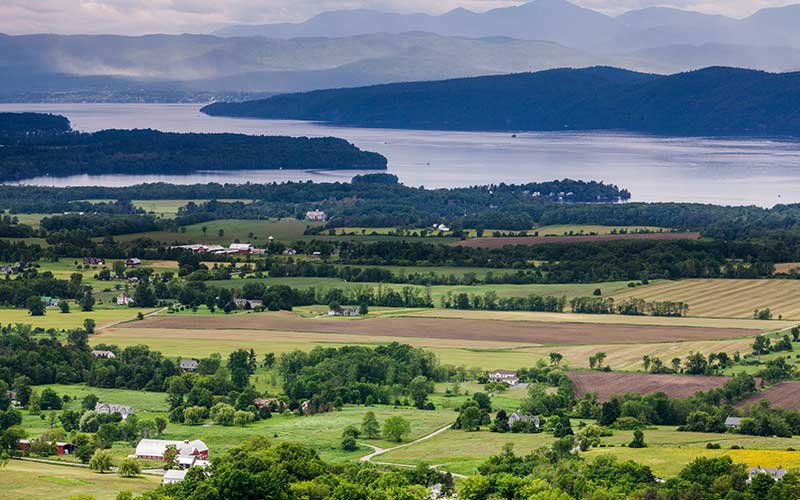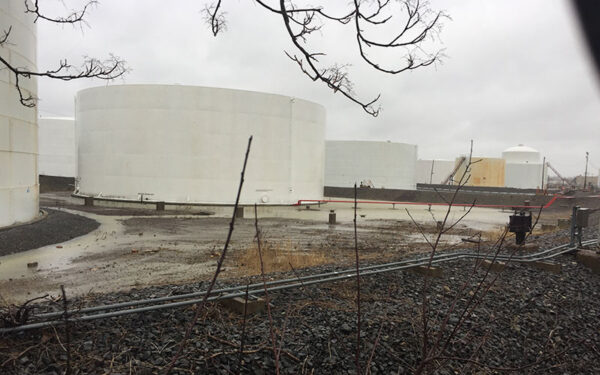
Action on climate change, a plastic bag ban, and long-term funding for cleaning up Lake Champlain are among CLF Vermont's top priorities in this legislative session. Photo: Melanie Bishop via Shutterstock
The Vermont General Assembly opens the 2019–2020 session on January 9 with a Democratic supermajority, new faces, and a full agenda.
One of CLF’s most critical roles is working with lawmakers to advance solutions that protect our natural resources on behalf of all Vermonters, build healthy communities, and sustain a vibrant economy. This session, our efforts are focused on cutting carbon and plastic pollution, protecting our children from the dangers of lead poisoning, securing much-needed funding to clean up Lake Champlain’s ailing waters, and safeguarding our critical land-use law. Here are our top priorities for the upcoming session.
Take Meaningful Action to Curb Climate-Damaging Emissions
Despite setting goals to cut carbon pollution a decade ago, climate-damaging emissions are on the rise in Vermont. The Agency of Natural Resources released a report this summer that documented a 16 percent increase in carbon emissions over 1990 levels.
To make matters even more urgent, the Intergovernmental Panel on Climate Change (IPCC) has determined that current goals for reducing emissions are nowhere near sufficient to avoid catastrophic consequences of climate change. Instead of cutting our emissions 80 percent by 2050 as nations around the world agreed to in the 2016 Paris Climate Accord, the IPCC has concluded we must eliminate all carbon pollution by 2050.
Goals alone are not enough, and Vermont is nowhere near on track to meet this challenge.
With climate action stymied at the federal level, it’s critical for states to step up. We still have time to act, but we must take meaningful action now by turning Vermont’s goals into clear mandates that curb carbon pollution. That includes advancing carbon pricing solutions that strengthen the economy and prioritize the most vulnerable. We will also be supporting legislation that cuts pollution from the transportation sector, promotes efficiency, and moves us closer to 100 percent renewable energy.
Secure Long-Term Funding for Clean Water
Our beautiful lakes and rivers belong to all Vermonters and are critical to sustaining our strong economy and healthy communities. Unfortunately, Lake Champlain and other Vermont waters are in crisis. The answer is clear: Vermont must invest in long-term funding to clean up and protect Lake Champlain and all state waters. Not only is it the right thing to do for Vermonters, it is required under the federal cleanup plan for Lake Champlain.
To date, the state has provided short-term funding but has been reluctant to commit to the long-term solution needed for this massive cleanup effort. We are working to change that. We need funding to support projects that are proven to reduce the pollution plaguing our waters – restoring wetlands, establishing buffers near waterways, and controlling pollution from stormwater on developed lands.
Protect Our Children from Exposure to Lead in Drinking Water
There is no safe level of lead exposure, especially for young children. Lead poisoning can significantly interfere with growth and development, cause behavior problems, and have lifelong adverse health consequences for a child.
Children across the U.S. continue to face significant health risks from lead poisoning, including lead in school drinking water. Vermont is no different. A recent study conducted by the Department of Health, Agency of Natural Resources, and Agency of Education found lead levels above the Vermont Health Advisory of 1 part per billion in multiple taps used for drinking or cooking at each of the 16 schools tested. Five schools had at least one tap with lead levels above the federal action level of 15 parts per billion.
However, testing for lead in school drinking water is not mandatory in Vermont, unlike other states including New Hampshire and New York. We cannot continue to leave our children vulnerable to this preventable tragedy. That’s why CLF is pushing for annual mandatory lead testing in all 381 of Vermont’s schools and a requirement to remediate unsafe water immediately.
Reduce Dangerous Plastic Pollution
Plastic pollution puts people, wildlife, and the environment in harm’s way. Many of us are already well aware of the dangers single-use plastic poses for ocean and marine life, but the scope of harm extends well beyond the ocean. Plastic bags, for example, are created from petroleum, which contributes to climate change, and the plants that manufacture plastics release toxic chemicals during production. What’s more, single-use plastics either make their way to landfills or incinerators, where they can contaminate the air and water of nearby communities, or end up as litter on our streets, in our parks, and in our waterways.
The good news is that there are simple and common sense solutions to reduce plastic pollution. In Vermont, Brattleboro has already banned plastic bags and several other towns are considering action. CLF will build on this progress in the year ahead and advocate for a statewide ban on single-use plastic bags.
Keep Act 250 Strong
Vermont’s land use law – Act 250 – has provided important public health and environmental protections for our communities for decades. As Act 250 approaches its 50th birthday in 2020, a legislative committee has spent the past 18 months examining opportunities to improve the law. As the legislature considers recommendations from this committee, CLF will be fighting against rollbacks and working to keep Act 250 strong.
Help Us Move This Critical Work Forward
Over the coming months, CLF advocates will be in and out of the statehouse working with legislators and pushing forward these critical bills. But we know that your voice is the most powerful for lawmakers to hear.
Please, sign up for our email alerts so you’ll be the first to know when you can make a difference by speaking up. And, if you’re not a CLF member already, please consider joining us. Your support ensures we have the resources we need to protect Vermont’s natural resources and build healthy communities together.



